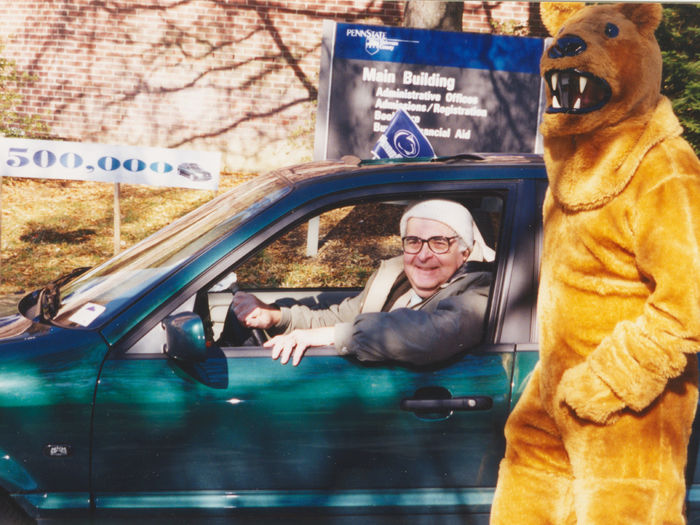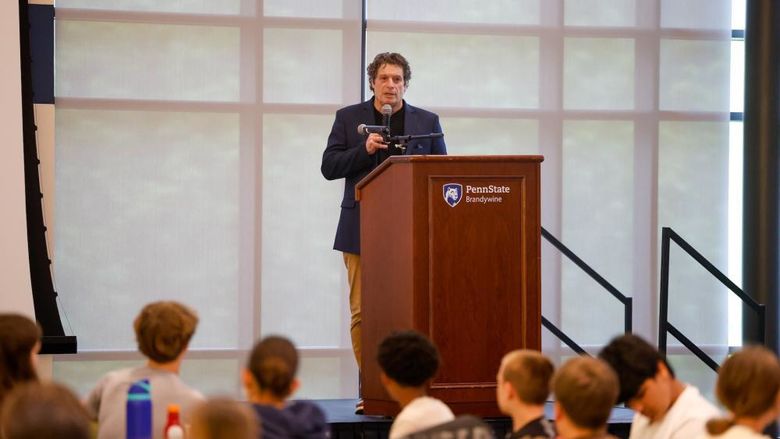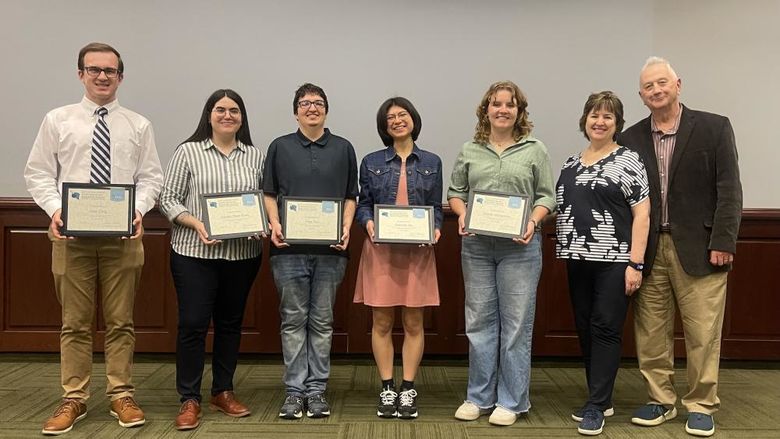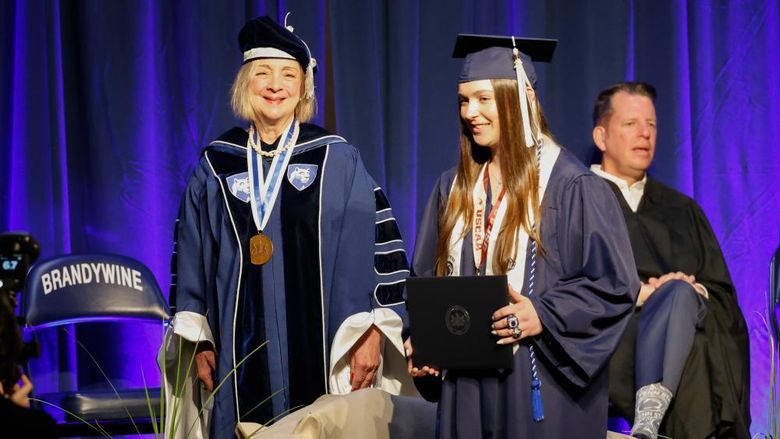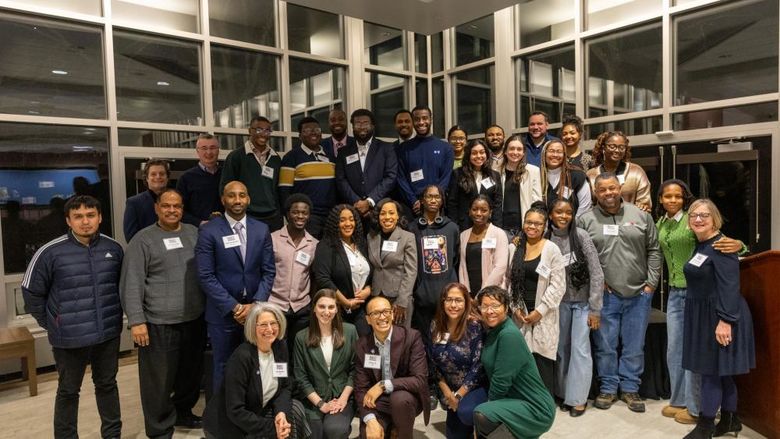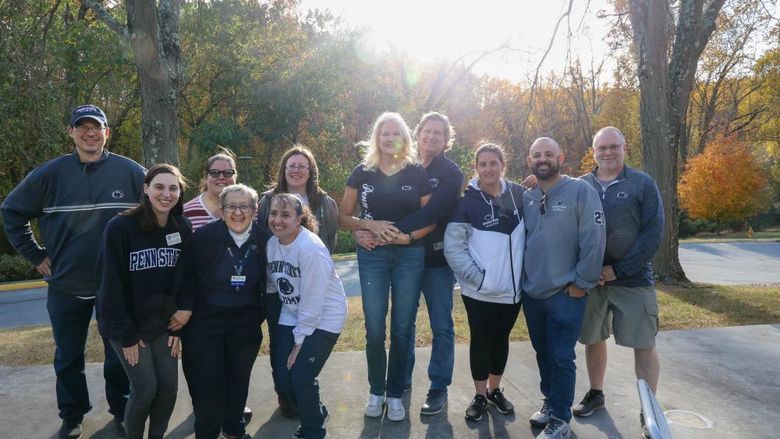Robert Ginsberg, professor emeritus of philosophy and comparative literature, and Brandywine Chancellor Marilyn J. Wells reviewed documents that Ginsberg was donating to the campus.
MEDIA, Pa. — Robert Ginsberg, professor emeritus of philosophy and comparative literature and the first faculty member hired at Penn State Brandywine, has donated his academic papers and other documents related to the campus’ early years to be housed at Brandywine in partnership with University Libraries. Ginsberg was hired in 1967 as Penn State prepared to open a new campus in Delaware County. He was the first of 11 original faculty members who taught 236 students during the campus’ inaugural year.
In the mid-1960s, the Delaware County Commissioners requested that Penn State open a local campus and the county provided 50 acres along with funding for an initial building. The campus began offering classes on Sept. 25, 1967, in temporary space underneath a roller-skating rink in Chester while the Main Building was under construction at the current campus location in Middletown Township. Operations were moved to the current location in December 1970. Originally called Penn State Delaware County, the name was changed to Penn State Brandywine in 2007.
During Ginsberg’s 35 years with Penn State, he “saved every scrap of paper,” he said.
“I didn't think of them as having value, but I thought that these could be consulted,” he explained. “They might lead me to further discoveries, and I didn't want to just throw them away, or neglect them. I couldn't foretell what would become of the history of the campus when it was founded. So, I played it safe by saving every scrap of paper. That way, I might be able to look back, or re-study, or build something out of those exams, or course notes, and that's why I did it, as care for the institution, care for the possibilities of the future.”
His records include syllabi, exams, early faculty senate records, documents related to the first years of the campus, correspondence with colleagues and students, and details on the Colloquium for Social Philosophy, an annual conference he founded and led for several years in the 1970s.
Correspondence reflects the full cycle of his Penn State career, from his 1967 letter to founding campus Director John D. Vairo accepting the faculty appointment — “This promises to be a most stimulating position for me.” — to then-retired Vairo’s 2002 note to Ginsberg upon his retirement — “Enjoy retirement, but never loaf. Keep that mind active.”
I played it safe by saving every scrap of paper. That way, I might be able to look back, or re-study, or build something out of those exams, or course notes, and that's why I did it, as care for the institution, care for the possibilities of the future.—Robert Ginsberg , professor emeritus of philosophy and comparative literature
Brandywine Chancellor Marilyn J. Wells and Director of Strategic Communications Bill Tyson recently visited Ginsberg at his home in Tacoma Park, Maryland, to receive his papers, which will be housed at Brandywine’s Vairo Library.
“It was a pleasure to meet Dr. Ginsberg,” Wells said. “We enjoyed learning more about his distinguished academic career and the early days of Penn State Delaware County, now Brandywine. It was quite apparent that he has a great fondness for and cherished memories of our campus and the many students who had the good fortune to enroll in his classes. We very much appreciate the contribution of his scholarly and historic records, which will be a wonderful addition to our campus archives.”
In addition to his written materials, Ginsberg also kept meticulous records of all things related to his academic career. By his account, he:
- Taught 5,109 students
- Graded 15,380 exams
- Taught 68 different Penn State courses
- Commuted 539,541 miles back and forth to Penn State Brandywine
- Wrote 678 letters of recommendation for students and colleagues
- Visited more than 60 countries for research, lectures, conferences and educational tours
After earning his doctorate in philosophy at the University of Pennsylvania, Ginsberg taught humanities for a year at the Drexel Institute of Technology (now Drexel University) before realizing he felt out of place as a philosopher at a technical college. His search for a new position brought him to Penn State, which was hiring faculty for its soon-to-open campus in Delaware County.
In 1972, Ginsberg and his wife, Ellen, moved near Washington, D.C. when she accepted a “temporary” position at the Catholic University of America. “Temporary” turned into “permanent,” and for 30 years Ginsberg made the 242-mile commute twice a week. In 1999, the campus celebrated a notable milestone: Ginsberg had reached 500,000 miles in his travels to and from campus.
In a narrative accompanying the donated materials, Ginsberg shared observations on his 35 years at Penn State, including these early memories that stood out:
- “(Campus Director) John D. Vairo conducted the official opening of the campus by invoking a meeting of the personnel on the Rollerdrome floor. We had to take off our shoes because of the slippery wax roller track. Dean of Students Edward Linder played some keys on the organ, while Vairo led us in singing the University’s traditional song. Only Vairo and Linder seemed to know the words. But it made a booming and historic grand opening. I had only mumbled my lips. I never learned the words in all my years.”
- Of the first faculty meeting on Sept. 18, 1967: “Vairo moved around in front of us giving us a pep talk. He spoke these words to us, ‘You are the pioneers.’ I remembered those words throughout my 35 years at Penn State. Vairo continued his opening address, ‘I want you all to begin planning for the year 2000.’ The colleague sitting next to me whispered in my ear, ‘This man is crazy. How can I plan for the year 2000 when I have no books for my courses and no blackboard in my room?’ I was won over by the vision that as pioneers, we would be the shaper of the campus for the next century. Moreover, I might have my job until 2000! This building might be the worst of settings but the best of opportunities.”
- “In another century, we started in a windowless great hall, divided by plywood partitions, beneath an active roller rink, adjacent to a busy railroad track, yards from a polluted and flood-prone creek, at the heart of Pennsylvania’s oldest and most neglected city. All that we were to become was then but mere dreams. A University is precisely that community in which the dreams of the intellect are realized.”
Ginsberg’s narrative also expressed his gratitude.
“This donation to Penn State Brandywine is intended as a gift, whatever it is worth, to the institution, as a history and a confession," he said. "But it is also a thank-you note to the campus for the invaluable gift that I received from Penn State Brandywine: 35 years of trust and opportunity to make whatever I could of myself as its devoted professor.”
